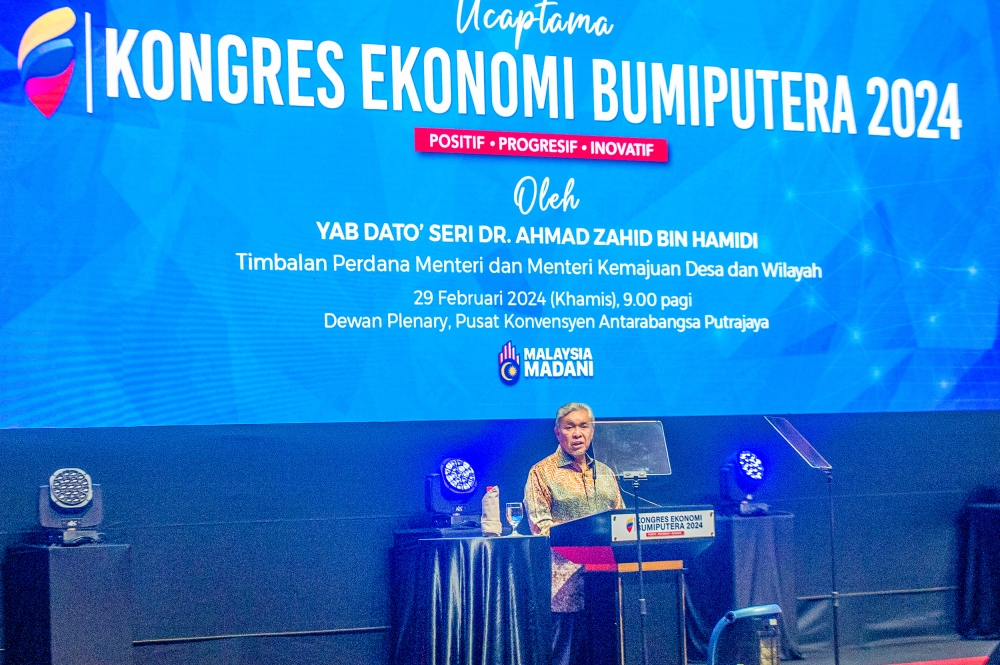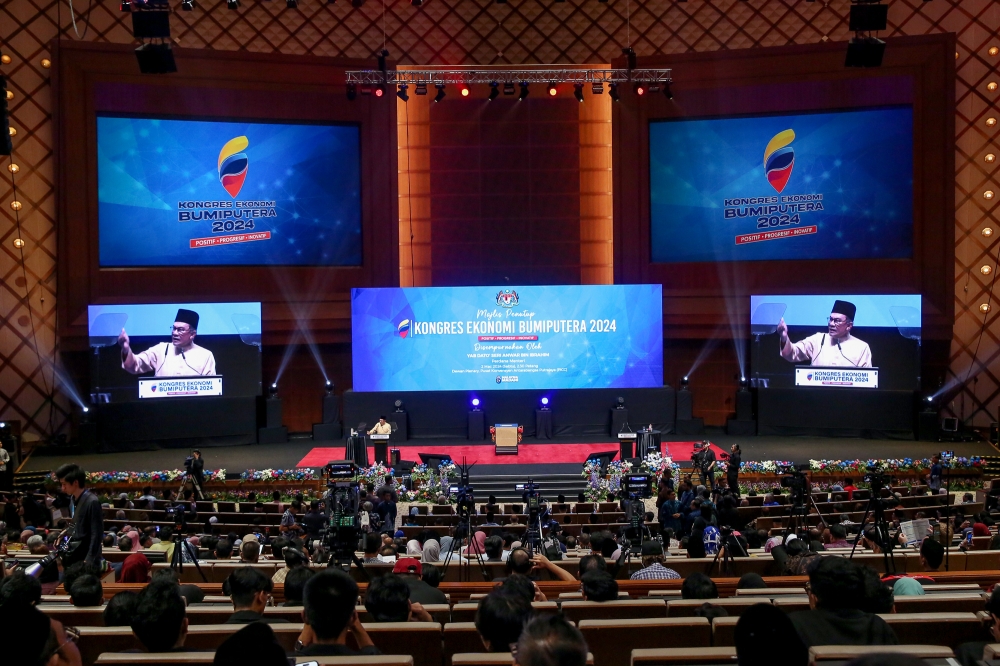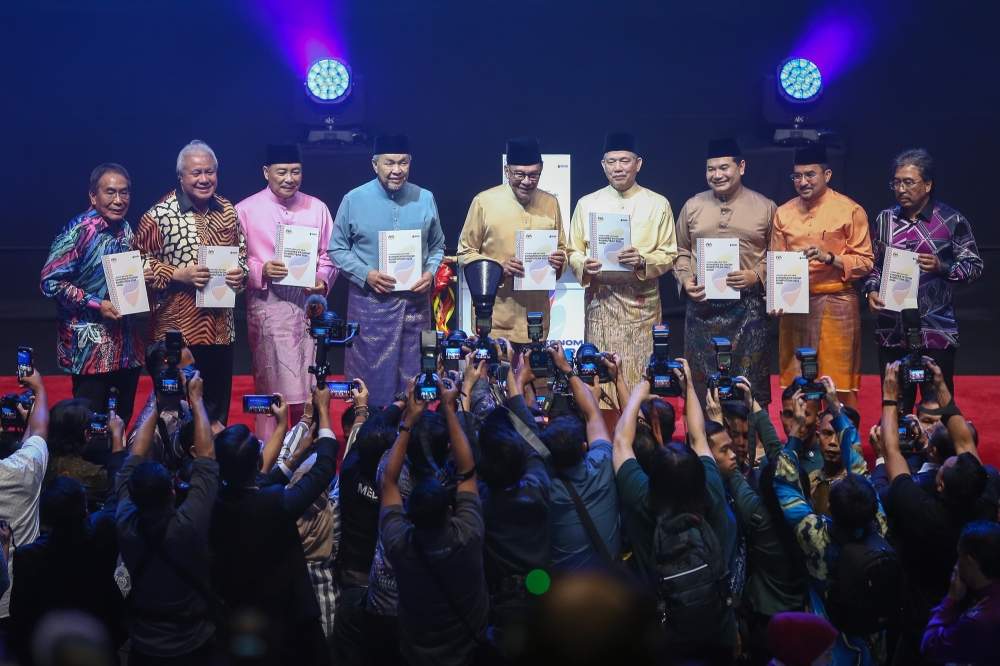PUTRAJAYA, March 3 — The 2024 Bumiputera Economic Congress is the seventh edition of a convention first inaugurated in 1965 as a platform to formulate policies that could help raise the Bumiputera socio-economic status.
Conceived by Umno, past conventions have led to policy actions that have lasted until today. Some of them remain the subject of fractious debates and various studies, such as race-based affirmative action in the form of Bumiputera quotas in education, employment, welfare assistance and government procurements.
This was the first such congress held under the premiership of Datuk Seri Anwar Ibrahim, who has been both a supporter and critic of Bumiputera intervention policies. When he was an Umno leader, he said pro-Bumiputera affirmative action is no-compromise. As the Opposition leader, he described the policy as a backdoor way to enrich Umno cronies.
Meanwhile economists and public policy buffs remain divided about whether or not pro-Bumiputera positive discrimination has worked.
Yet, most of them somewhat agree that these state-sponsored congresses, while initially noble, have morphed into an avenue for political grandstanding, mostly by highlighting the lack of Bumiputera corporate success as a reason to continue voting for Umno.
This year’s congress was yet again pushed by Umno, but this time with the blessing of one its staunchest critics, Anwar. These are the three things we learnt from the three-day convention:

The end of race-rhetoric... maybe
From the onset it was clear that talking heads at this year’s congress would veer away from peddling race rhetoric, an expected move given they are now a part of a ruling coalition that on the surface at least appears reformist.
This was reflected in the opening speech itself which was delivered by Deputy Prime Minister Datuk Seri Ahmad Zahid Hamidi, also the Umno president.
Using sober language, the deputy prime minister attempted to talk sense into the Bumiputera community who have been told for decades that inter-ethnic economic competition — instead of co-operation and interdependence — is inevitable.
These provocative innuendos were completely absent throughout the three-day congress. What was heard instead were soothing terms that invoked unity, community and plurality.
Prime Minister Datuk Seri Anwar himself stressed to his conservative colleagues in the government that even if the majority of small and micro businesses are owned by Malaysian-Chinese, no Malaysian can be prosperous unless all are prosperous.
Yes, both Anwar and Zahid did say the “struggle” to elevate Bumiputera socio-economic status can never be a bargaining chip, but emphasis was also given to equal opportunity and economic fairness.
So does this signal a genuine end to a race-based economic discourse? That remains to be seen.

A missed opportunity?
The saying goes: The proof of the pudding is in the eating. Ahead of the February 28 congress, economists who studied the New Economic Policy and pro-Bumiputera policies said the convention could be the perfect opportunity for policymakers to effect genuine changes to an economic framework that is dated and, somehow, still ambiguous.
Among some of the long-called-for recommendations is reviewing the Bumiputera 30 per cent equity, which some experts believe is long overdue.
Lee Hwok Aun, a senior fellow at the ISEAS-Yusof Ishak Institute (a Singapore research institution), suggested the goals of a Bumiputera economic framework would be more effective if driven “by targets such as the quantity and quality of Bumiputera enterprises, and growth in mid-tier companies”, given how the community’s businesses are still mostly micro- and small-enterprises relative to other communities.
He said the fixation with equity ownership has blocked progress in several ways, including the misplaced priority on acquisition instead of productivity.
The seventh edition of the KEB made no mention, or at least in no clear terms, that the government intends to adopt indicators that are more in tune with current needs. Despite mounting criticism, including by the Economy Minister Rafizi Ramli, the Bumiputera 30 per cent equity goal seems set to stay.

More action needed... not just talk
For all the talk of inclusivity, diversity and progressiveness, the congress was very much a rigidly top-down affair. Presentations were mostly by corporate captains from a bygone era, and they also made up the majority of the panellists invited to talk.
Successful younger Bumiputera businessmen or women who could have injected new vigour into the Bumiputera economic framework were mostly relegated to the audience. Women Bumiputera corporate leaders were also noticeably missing.
Clearly, much more needs to truly recognise the importance of diverse voices and views, especially from capable young people from the community.
Until people behind the congress make genuine changes, the public are likely to view future conventions as nothing more than yet another talk fest and plunge the KEB further into irrelevance, that is if it’s not already there.






















